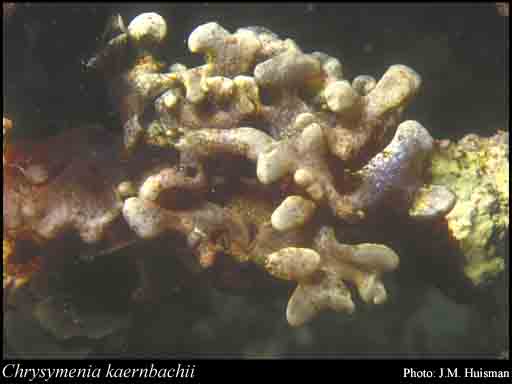- Reference
- K.M.Schumann & M.U.Hollrung, Fl.Kais.Wilh.Land 4 (1889)
- Conservation Code
- Not threatened
- Naturalised Status
- Native to Western Australia
- Name Status
- Current

Scientific Description
Habit and structure. Thallus predominantly erect, but with decumbent portions that attach to the substratum, to 11 cm tall, blotchy red with a sheen when living, irregularly branched, with terete to compressed lobed branches 10–25 mm wide, with occasional anastomoses between branches. Structure with an internal mucilage-filled cavity and an outer pseudoparenchymatous layer composed of an inner medulla of several layers of large hyaline cells grading to a cortex of smaller pigmented cells. Rhizoidal cells arising occasionally to commonly from the inner medullary cells. Gland cells obovoid to pyriform, borne on the inner surface of the medulla and projecting into the cavity 20–25 µm in diameter.
Reproduction. Cystocarps slightly protuberant, mostly projecting into the thallus cavity. Gonimoblast spherical to slightly flattened, 350–500 µm in diameter with carposporangia 10–12 µm in diameter. Other reproductive structures not seen.
Distribution. Known from the tropical Indo-Pacific; in north-western Australia from Ningaloo. Also recorded from the Houtman Abrolhos.
Distribution
- IBRA Regions
- Carnarvon.
- IBRA Subregions
- Cape Range.
- IMCRA Regions
- Abrolhos Islands.
- Local Government Areas (LGAs)
- Ashburton, Greater Geraldton.